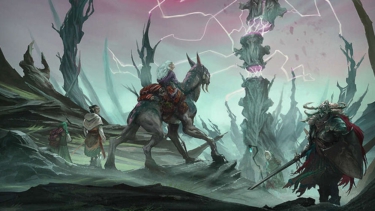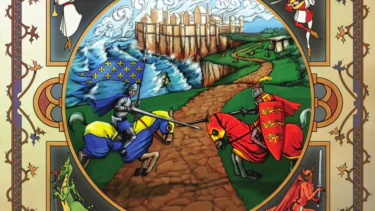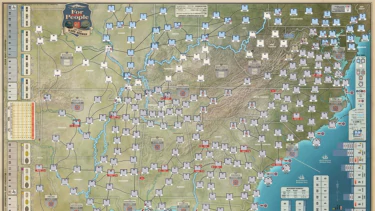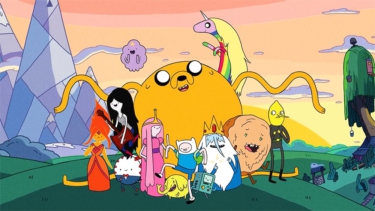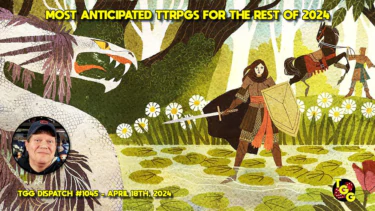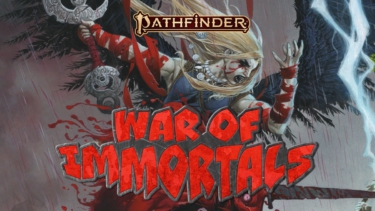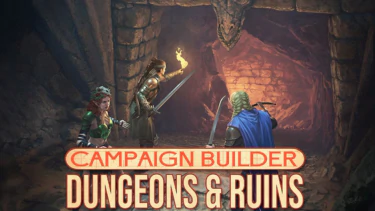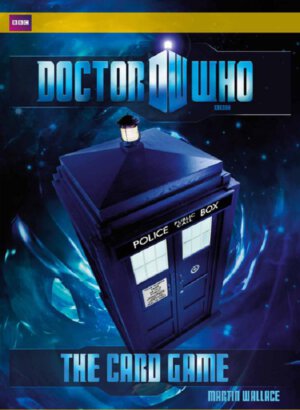
Publisher: Cubicle 7 Entertainment
Designer: Martin Wallace
Year: 2012
Players: 3 – 4
Ages: 13+
Playing Time: 60 Minutes
Retail Price: $30.00
Category: Card Game
Components:
- Rule book
- Four sets of player pieces, each one consisting of five TARDIS counters and five Dalek counters.
- One set of Game cards (one hundred and twenty seven in all)
- Four Starting Location cards
- One Game End card
- Thirty Time tokens
From Cubicle Seven:
“Daleks! Cybermen! Sontarans! The list of threats is endless and no place in the universe is ever truly safe from danger. But there’s one man who’s made it his mission to defend the defenseless, help the helpless, and save everyone he can. A mysterious stranger. A force of nature who has seen his own planet die. A madman with a box.”
‘The Doctor Who Card Game’ is an action packed adventure for three to four players designed by Martin Wallace. To win the game you will have to use your wits and courage to:
- Defend the universe as the Doctor and his companions.
- Send the Doctor’s enemies to conquer the places your competitors are trying to protect.
- Save the universe!
The Doctor Who Card game is Cubicle Seven’s first foray out of role playing games and into hobby gaming. As a UK based company already licensed to produce Doctor Who related games (they produce the Doctor Who Role Playing Game), they are tailor fit to create the Doctor Who card game.
The game is designed by Martin Wallace, the well known designer of many great games such as Age of Steam, Automobile, 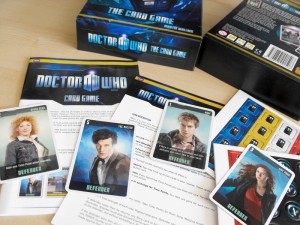
The theme is Doctor Who, the Eleventh Doctor version. The players will find themselves placing and defending locations throughout time and space, while attacking the other players with some of the evil scum that populates our universe. When the game is over the players add up all of the victory points for each location they control, and the player with the most points wins the game.
In addition to the 127 cards included in the game, there are tokens for each player. Five each of TARDIS tokens and Dalek tokens. A pile of time point tokens rounds out the list of components, and become crucial to game play later on. One thing I want to mention that bothers me about this game, as it does in any game, is the fact that it is for three or four players only. I much prefer games with a wider range, and a two player option is something I personally like to see in the games I play.
The rules are not that complex, but they are vague in several spots. It is one of those rulebooks that uses a very small font and I had a some difficulty reading it.
I’m going to do my best to describe the mechanics of the game as simply as possible. Players each receive a random starting location card, which also determines who the first player will be. These are played in front of each player face up. Then each player is dealt five cards, except the player to the right of the first player, who only receives two.
The main rule to remember is that a player must pass exactly three cards to the player to their right at the end of their turn. You can take as many actions as you want during your turn, as long as you have those three cards to pass at the end of your turn. This is why the player to the right of the first player only receives two cards, because the first player will pass three cards to them when their turn is complete.
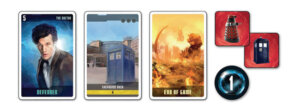
Another action is that you can play one or more defender cards on one of your locations. There are four different defender cards and each has a different strength. The defenders are: The Doctor, Amy Pond, Rory, and River Song. Only one of each can be at a location. Even the Doctor can’t be in the same location twice.
You can play enemy cards against another player’s locations. These go face down unless there are defenders present. In that case defenders and attackers are flipped up and the highest strength wins, with ties going to the defender. If the defense wins, then all attackers and defenders are discarded and the defender places a TARDIS token on the location, showing that the Doctor is protecting it. If the attacker wins, the defenders are discarded and then possibly some of the attackers too, but this is the rule that is vague and could use some clarification. In any event, some of the attackers remain and now control that location until the defending player can manage to put together a defense capable of driving off the attackers. The attacker places a Dalek token at that location to show that they have control of it.
One note on the enemy cards. To mount an attack, you must play cards of the same type only. Cybermen can only join forces with other Cybermen, the Daleks can’t join the attack. If an attacker can be combined with another enemy type, it is indicated on the card. For example, the Master can join forces with anyone to mount an attack against a location.
You can also play a support card. These are one shot cards that have various effects. There are a lot of good support cards that can really help you at a crucial time.
One of the most strategic actions that you can take is to place a card in your reserve. You can keep up to two cards off to the side that you can pull back in and use at any time during a future turn. This is the only way you have to hang onto a useful card, as you get rid of all of your cards every turn. A couple of cards even allow you to keep an extra card in your reserve, very handy indeed.
You can cash in five time points to purchase an extra card into your hand. This gives you an extra action and this can make a big difference at a crucial time.
Finally you can also discard one or two cards to gain time points. I rarely used this option as cards are such a precious commodity, and it takes five life points to buy one card so the exchange rate is way out of balance.
Once you finish your actions, you pass the three remaining cards in your hand to the player on your right, and then play passes to the player on your left. It might take some time to get the hang of this, pass the cards this way and then the player the other way goes next. Before the next player takes their turn you draw two cards from the deck and then you are done.
Play continues until one of two conditions are met. It ends immediately if a player starts their turn with either all of their TARDIS tokens in play or all of their Dalek tokens in play. Players can usually easily avoid this if they pay attention, so the second method of ending the game happens most of the time.

The game is very mechanic based, and it leads to some interesting strategies. There is luck involved, as if you manage to draw a lot of location cards you have a distinct advantage over the other players. The card passing mechanic is interesting as is the reserve cards and the time points. If you can manage to play these right, and have a little luck when drawing your cards, you can pull out a win.
I did like playing Doctor Who The Card Game, but at times it felt more as if the game was playing me instead. I always thought that there was more to the Doctor than just fighting, but it is still an interesting game. I would like some clarification to the rules for discarding enemy cards during a successful attack, and a few more clarifications. Like what happens of you get all of your tokens played while playing the end game sequence? Does it end then? Or do you finish out the whole end game sequence? Also, if you run out of Dalek tokens, can you continue to attack? This can happen and I don’t know the answer. A few clarifications would help a lot. I’m waiting for a FAQ to be released.
I think that fans of Doctor Who or Martin Wallace games will like the card game. My problem is that I found it more of a mechanical exercise than a trip into the Whoverse. I guess you’d say it is distinctly Euro, so a lot of people will love the game and a lot of people won’t, it depends on your own taste.
I also think the game could use some more balancing. Once you’ve got some powerful enemies stacked at a location, it becomes almost impossible to dislodge them. You can only have up to four defender cards total which add up to 11 total strength, and usually because of the card passing mechanic it is difficult to get more than two. The attacker can add more enemies to their attack as they draw them, so you could end up facing three Daleks with a total strength of 18, which would be practically impossible to dislodge. Only a bare handful of support cards can extract you from that situation.
Overall, I found it ok. Ultimately, Doctor Who the Card Game will depend upon your own tastes as I found some things that I liked and some things that I didn’t like. So I have endeavored to provide enough information to help you make up your own mind.
- A Dungeon Delve for Kids?: A Review of Dungeon! - Oct 24, 2022
- Better, Stronger, Faster | Descent: Journeys in the Dark Second Edition Reviewed - Oct 23, 2022
- Your Planet is Doomed!: Invasion from Outer Space Reviewed - Oct 22, 2022




